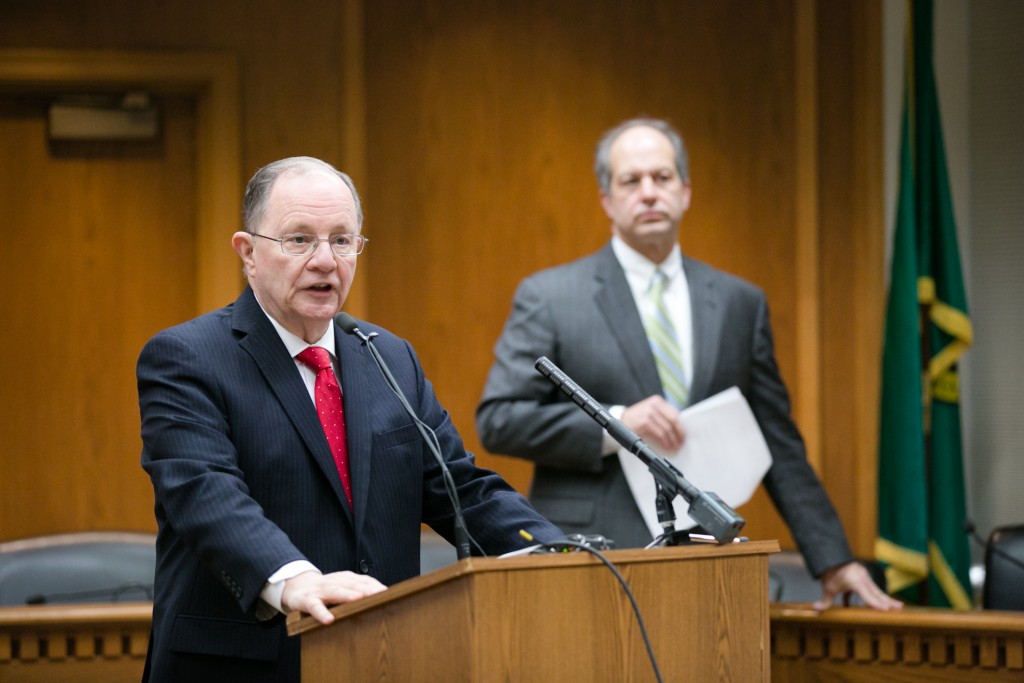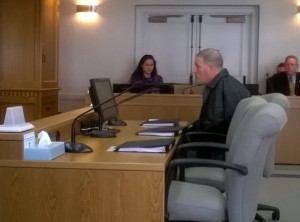This newsletter was distributed to Sen. Mike Padden’s subscribers on Feb. 26, 2016. To subscribe to Sen. Padden’s newsletters, click here.

A news conference with Sen. Steve O’Ban, R-Pierce County, as hearings began Monday into the debacle at the Department of Corrections. This week the two of us authored an op-ed on the Senate investigation that appeared in the Seattle Times.
This week the Senate launched hearings into the management troubles at the Department of Corrections that caused thousands of felons to be released early and may have caused the deaths of two innocent people.
For me, as chairman of the Senate Law and Justice Committee, the terrible problems at this state agency have been a particular focus during the final weeks of this year’s legislative session. But there are many other issues that also are of importance to the people of the 4th District this year. Our current legislative session is scheduled to finish by March 10, and we are going to have a busy two weeks as we bring matters to a conclusion.
Among other things, we passed a bill in the state Senate last week to help assure a steady supply of water for the growing communities of the Spokane Valley. We also kicked off the annual debate over the budget as the House and Senate took action on competing spending plans. In this newsletter I’ll tell you about some of the important matters that occupy us as our session nears its finish.
Big mistake at Corrections took five minutes to find
It took all of five minutes for truck driver Matthew Mirante, Sr. to figure out something had gone haywire at the state Department of Corrections. His son had been stabbed nearly to death in 2011 and the assailant had been sentenced to prison. But when Mirante asked when the man was to be released, and Corrections told him Feb. 5, 2013, something seemed a bit off.
Mirante sat down with pencil and paper and in five minutes he had it worked out. Corrections was off by six weeks. The man should have been released on March 22.
We heard this story in committee Monday as we launched our investigative hearings into the Department of Corrections case, and it told us much about the culture of indifference that has prevailed at this agency for too long a time. Not only did Corrections fail to check the calculations when it reprogrammed its computers in 2002, it did nothing to fix the problem when Mirante notifed the agency a decade later. It was another three years before Corrections finally took action – and in the meantime, many more inmates had been improperly released.
Around the Capitol there is general acknowledgment that this is one of the worst cases of government malfeasance in the history of the state, and that we face enormous liability for the department’s failure to protect the public. On Thursday we got a thorough demonstration of the need for the Senate probe.
The governor released a report he commissioned, which pins the blame on workers who are low in the chain of command. But we heard a much more plausible explanation in our committee, as current and former information technology directors for the agency testified that a troubled and likely-failed computer project absorbed all the attention of upper managers. We know someone in upper management formally downgraded the urgency of the request to fix the sentencing problem – which is why the matter went unaddressed for years. We look forward to getting to the bottom of this, and to telling the parts of the story the governor’s report left out.
Please take a moment to participate in my survey!
This month many of you received a newsletter that contained my 2016 legislative update and survey. I am interested in hearing what you think about the major issues that confront us this year. If you have not done so already, I hope you will take a moment to put it in the mail. For those who find online participation easier, I also have posted the same survey to my website, at https://mikepadden.src.wastateleg.org/ and at this link. I will share the results with you in a coming newsletter.

This week I met with Pam Haley and Luc Jasmin III in my office at the Capitol. Haley and Jasmin are co-owners of the Parkview Early Learning Center in Spokane.
A delightful evening with my 4th District friends
Wednesday night it was my pleasure to join my House seatmates, Reps. Matt Shea and Bob McCaslin, Jr., for a telephone town hall meeting. For an hour, in a relaxed format much like a talk-radio program, we chatted about the issues of greatest importance to the people of the 4th Legislative District – everything from the Corrections issue to property crime. We posed a number of questions to our listeners – here are the results:
Do you think government management of public lands, such as forests, rangeland, etc., is having an impact on private property rights?
Yes – government is mismanaging public lands, leading to physical and economic destruction – 53.1 percent.
No – government is managing public lands just fine and having no impact – 21.4 percent.
No opinion – 13 percent.
In December, the governor’s office revealed that over the previous 13 years the state Department of Corrections released more than 3,200 violent inmates before their sentences were finished. Police tell us at least two people were killed by inmates who should have been behind bars. How should this matter be investigated?
The Senate should conduct an independent inquiry with the ability to issue subpoenas – 90 percent.
The governor should be the only one to investigate – 10 percent.
When you think of public education, what do you see as the main problem?
Overreliance on testing – 43 percent.
Lack of school choice – 30 percent.
Lack of funding – 13 percent.
A shortage of teachers – 13 percent.
Bills in progress
This has been a fast-paced legislative session so far, but we have now reached the point in the session where everything happens at lightspeed. We have just two weeks to go before our scheduled adjournment on March 10, and there is still much that must be accomplished. The most important job of the year is the passage of a supplemental budget. The majority Democrats in the House passed their proposal Thursday, and the Senate followed Friday with a plan that does a better job of meeting the needs of K-12 schools while keeping spending balanced over the long term.
Ten of my bills passed out of the Senate before an important February 17th deadline for passage of measures from their houses of origin. These include Senate Bill 6215, a measure that assures adequate water supplies for the fast-growing communities of the Spokane Valley. You can read about it here.
Another is SB 6016, an effort to increase transparency and fairness in administrative judicial proceedings. As it stands right now, disputes within state agencies are reviewed by an in-house administrative judge, a practice that can contribute to an appearance of bias and undue agency influence. This bill would require that these disputes be handled by independent administrative law judges employed by the Office of Administrative Hearings, who would issue final orders that can still be appealed in superior court. By strengthening the conditions for transparency and fairness, this legislation makes a positive step towards renewing the public’s trust in quasi-judicial review forums.
Another important piece of legislation is SB 5363, which addresses the laws that govern the power of a government to take private property for public use (commonly referred to as eminent domain). Currently, there is some legal ambiguity about what constitutes a “public use.” This bill clarifies that term and adds a stipulation that taking private property for the purposes of economic development shall not be considered a public use. If passed into law, this bill will help to protect citizens’ private property from unwarranted government purchase.
Additionally, the Law and Justice committee sent 32 bills to the House (out of more than 100 referred to the committee), where they will now be considered. They include SB 6165, a promising piece of legislation on gun rights. This measure expands permitted usage of short-barreled rifles, making owning, buying and selling a short-barreled rifle legal so long as compliance with federal law is maintained.
Thanks to Tucker Christensen and Luke Moore for serving as Senate pages!
This week it was my honor to host as pages two young men from the Oaks Classical Christian Academy in Spokane Valley. Luke Moore and Tucker Christensen are high-achieving juniors at Oaks, actively involved in extracurricular activities like debate and athletics. In addition to maintaining stellar academic records, Tucker and Luke also use their spare time to volunteer in the Spokane community. Luke tells me he is planning on applying to a military academy and pursuing work in medicine. Tucker is on the lookout for a career that incorporates his love of math, science, and languages. Both Luke and Tucker enjoyed their week as pages and consider it a valuable experience that will prepare them for future aspirations.













